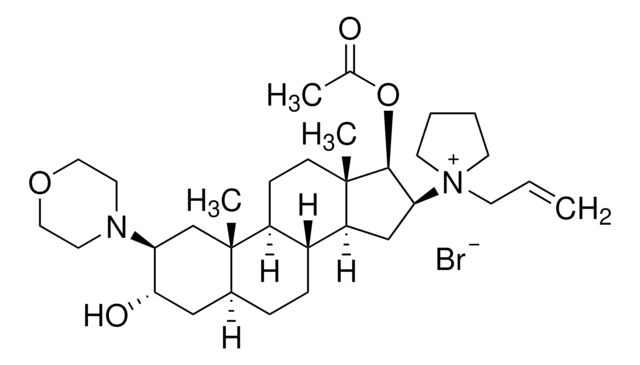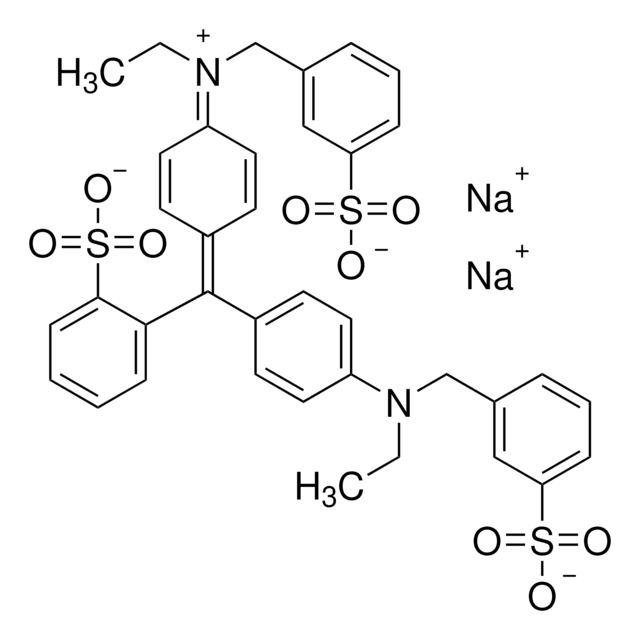1044800
USP
Atracurium besylate
United States Pharmacopeia (USP) Reference Standard
Synonym(s):
2,2′-[1,5-Pentanediylbis[oxy(3-oxo-3,1-propanediyl)]]bis[1-[3,4-dimethoxyphenyl)methyl]-1,2,3,4-tetrahydro-6,7-dimethoxy-2-methylisoquinolinium]dibenzenesulfonate, BW-33A, Tracrium
About This Item
Recommended Products
grade
pharmaceutical primary standard
API family
atracurium
manufacturer/tradename
USP
application(s)
pharmaceutical (small molecule)
format
neat
storage temp.
2-8°C
SMILES string
[O-]S(=O)(=O)c1ccccc1.[O-]S(=O)(=O)c2ccccc2.COc3ccc(CC4c5cc(OC)c(OC)cc5CC[N+]4(C)CCC(=O)OCCCCCOC(=O)CC[N+]6(C)CCc7cc(OC)c(OC)cc7C6Cc8ccc(OC)c(OC)c8)cc3OC
InChI
1S/C53H72N2O12.2C6H6O3S/c1-54(22-18-38-32-48(62-7)50(64-9)34-40(38)42(54)28-36-14-16-44(58-3)46(30-36)60-5)24-20-52(56)66-26-12-11-13-27-67-53(57)21-25-55(2)23-19-39-33-49(63-8)51(65-10)35-41(39)43(55)29-37-15-17-45(59-4)47(31-37)61-6;2*7-10(8,9)6-4-2-1-3-5-6/h14-17,30-35,42-43H,11-13,18-29H2,1-10H3;2*1-5H,(H,7,8,9)/q+2;;/p-2
InChI key
XXZSQOVSEBAPGS-UHFFFAOYSA-L
Gene Information
human ... CHRNA1(1134) , CHRNB1(1140) , CHRND(1144) , CHRNE(1145) , CHRNG(1146)
Looking for similar products? Visit Product Comparison Guide
General description
Application
- The feasibility of the posterior tibial nerve-flexor hallucis brevis pathway applied in neuromuscular monitoring: This multicentric, controlled, and prospective clinical trial investigates a new method for neuromuscular monitoring using Atracurium besylate, providing insights into improving surgical anesthesia practices (Chen et al., 2024).
- Onset and duration of action of escalating doses of atracurium in anesthetized healthy goats: This study assesses the pharmacokinetics and pharmacodynamics of Atracurium besylate in veterinary medicine, highlighting its efficacy and safety in non-human subjects, which is crucial for translating findings to human clinical settings (Ishihara et al., 2024).
- Under-dosing and over-dosing of neuromuscular blocking drugs and reversal agents: beware of the risks: This editorial discusses the critical balance required in dosing Atracurium besylate to optimize patient outcomes and minimize side effects in surgical settings, emphasizing the importance of precise dosing for effective neuromuscular blockade (Hunter and Blobner, 2024).
- Comparison of the Onset of Action, Maintenance, and Recovery of Three Weight-based Dosing of Cisatracurium in Patients with Morbid Obesity in Laparoscopic Bariatric Surgery: Although focused on Cisatracurium, this study provides comparative insights that could be applicable to similar studies on Atracurium besylate, particularly in terms of dose adjustment for specific patient populations undergoing surgical procedures (Rokhtabnak et al., 2023).
- Neuromuscular Blockade: This piece provides a broad overview of neuromuscular blocking agents like Atracurium besylate, discussing their mechanisms and applications in clinical anesthesia, which is essential for understanding the full scope of these drugs′ utility in medical practice (Cook and Simons, 2024).
Biochem/physiol Actions
Analysis Note
Other Notes
related product
Storage Class Code
11 - Combustible Solids
WGK
WGK 3
Flash Point(F)
Not applicable
Flash Point(C)
Not applicable
Choose from one of the most recent versions:
Certificates of Analysis (COA)
Sorry, we don't have COAs for this product available online at this time.
If you need assistance, please contact Customer Support.
Already Own This Product?
Find documentation for the products that you have recently purchased in the Document Library.
Our team of scientists has experience in all areas of research including Life Science, Material Science, Chemical Synthesis, Chromatography, Analytical and many others.
Contact Technical Service




